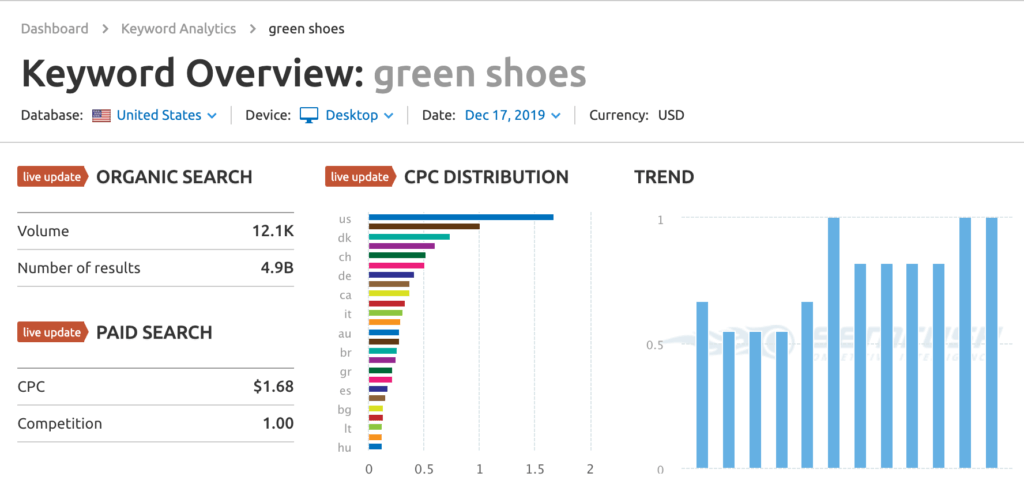Setting up an e-commerce site online is one of the best ways to consistently make money online. The key to its success is online traffic, and the best long-term way to ensure traffic is through eCommerce SEO.
According to the Search Engine Journal, 93 percent of online activities start through a search. Here is a complete guide to eCommerce SEO on what you can do to leverage an effective e-commerce SEO strategy for your site and drive more targeted, organic search traffic and buyers to your site:
Search engine optimization for e-commerce sites has various benefits:
SEO for e-commerce sites can be quite different from the SEO best practices one might want to pursue on blogs or corporate websites. Apart from the fact that on store sites, products get shuffled and added all the time, there are a few other SEO issues specific to the e-com space:
One of the major reasons for an e-commerce site to not gain enough organic traffic is the use of duplicate content. The e-commerce site’s nature and structure make it susceptible to having multiple URLs basically showing the same or very similar content. When multiple versions of essentially the same content get indexed, the result is wasted crawl budget and duplicate page content issues.
Here are a few solutions that can be considered, depending on each specific case:
Most eCommerce sites - especially in the early stages - use their product manufacturers’ product descriptions directly in their own store. This practice is frowned upon by search engines as it produces hundreds or even thousands of different websites with the exact same content.
Apart from the obvious eCommerce SEO issue with duplication, most descriptions are not written properly with the goal of selling the product, but rather mention its benefits without any further copywriting essentials.
The solution: An eCommerce site owner always produces original, fresh content for every product and stays away from existing content. Search engines have become better and stricter in kicking out sites due to duplicate content and content scraping. Also, since BERT, they got much smarter in understanding the meaning depending on the respective context, which again stresses the importance of counting on professional copywriters’ skills to develop optimized descriptions.
In cases where no original description can be written (or may still be in process), an idea could be to no-index those URLs until the description is ready.
It is paramount to consider the demand (search volume, check e. g. with semrush) as well as search keywords that online users type on search engines whenever title pages, meta descriptions, product descriptions, and headlines are written.

We often come across important pages like category and product pages that clients want to see the ranking for search terms that are hardly being searched for. Extensive eCommerce keyword research is essential for any eCommerce website!
You can use google keyword planner to find keywords ideas for your product page and category pages like long-tail keywords and target keywords.
Apart from the keyword research, here are some of the On-page SEO for eCommerce techniques that can do to optimize product pages to improve search engines results:
A page’s title tag is probably one of the most important on-page elements of a URL. Not only is it decisive for a search result’s click-through-rate CTR in search engine results (SERPs) – Google also takes it into account to check what the overall page’s content is about.
Make sure to have a unique page title and try to avoid identical values in your eCommerce websites, even though this might be difficult when dealing with similar product names from the same brand.
Research has revealed that most online shoppers use key phrases when they search for items or services online instead of single keywords.
A wise technique for you to nail down the right target keywords is to survey the customers and find out more about the language they use when searching for or talking about the items you sell on your eCommerce store.
It is a grave error not to include Like, Tweet, Pin, or StumbleUpon buttons on the page. Be aware of the personas you are targeting to decide the social networks that you are going to feature - the persona must be based on your core product offerings, e. g.:
Always tie in the specific audience to feature the particular button that suits them best. It’s better to simplify things using personas. Spamming the web pages with Share buttons can only decrease the impact of the company’s call to action of the "add to cart" button.
Some technical elements must be found on the page on your site, such as:
To maximize the impact of SEO efforts on any eCommerce store, it is crucial to know the site’s specific situation in SEO best practices. You can do this through the aid of an e-commerce SEO site audit, which
While it is possible to do an SEO audit on your own, you might be better off saving on all the tools necessary and hiring a professional SEO agency that already has both, the tools and the necessary experience on how to use them.

To get a first glance, there are also some free tools available, such as Browseo, Majestic, Google Analytics, Google Search Console, SEO Report Card, and the MOZ’s Crawl Test Tool.
To ensure that SEO is easily implemented on your e-commerce site, it is important to choose the most appropriate and beneficial e-commerce platform.
In the following, we list 3 of the top e-commerce platforms available for any online entrepreneur. These are Magento, Woocommerce, and Shopify:
This e-commerce platform is designed using open-source technology. It provides online entrepreneurs with a flexible shopping cart system, control on the online shop’s look and functionality, and powerful content marketing for eCommerce, SEO, and catalog-management tools.
It is designed to be used as an application by any individual who is not a developer. It has other valuable benefits namely effective and cost-saving programs that enable discounts and promotions when checking out, easy installation and additional layouts and plug-ins, offers more than 50 payment gateways, and offers highly scalable e-commerce solutions.
Shopify is probably the best and easiest eCommerce platform for online stores that only require minimal configuration. There are several benefits to using Shopify:

Woocommerce is an open-source eCommerce WordPress plugin. This is intended for small to large online businesses. There are multiple reasons to use the WordPress plugin for your e-commerce store. It looks professional and highly secure, although Wordpress historically has been one of the platforms that gets the most hacking attempts.
Woocommerce makes website analytics easy since it has built-in analytics on the platform. It is also flexible, and it provides customization options. Most important of all, the platform is free.
If you would like to see your eCommerce SEO audit moving in the right direction, check out our affordable SEO Quick Wins which will give you a head start compared to your competition and set you up for organic traffic success.



